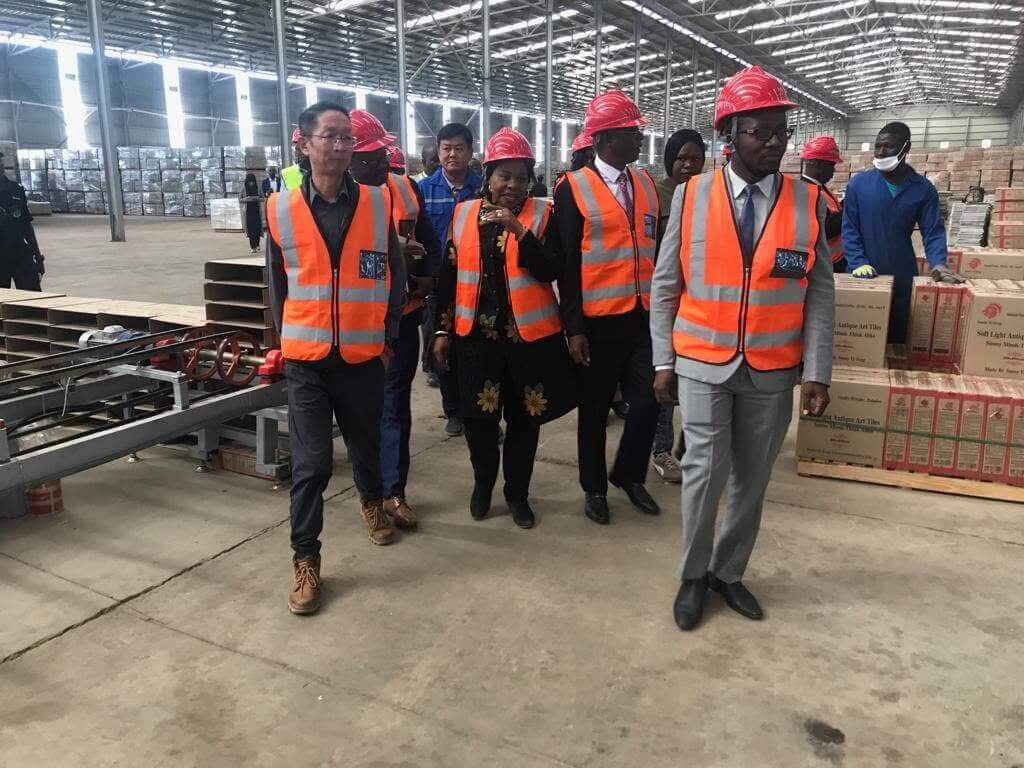Chinese ceramic tiles manufacturing company Sunny Yi Feng has entered into a war of words with the Zimbabwe Congress of Trade Unions (ZCTU) over claims of labour rights abuses, including unsafe working and living conditions.
ZCTU President Peter Mutasa told local news outlet New Zimbabwe: “The company is using some chemicals in the manufacture of ceramic tiles and in the process female workers end up collapsing. The company uses a system where it uses forklifts to carry workers who would have collapsed out of the factory.”
He added, “What boggles the mind is that these workers are being paid Z$3,500 which is equivalent to around US$35 monthly salary. They are offered company accommodation in which around 16 people share one room, and this is highly risky especially during this COVID-19 pandemic era.”
At this stage, no legal action has been taken and ZCTU has only launched a social media campaign to raise awareness about the working and living conditions at Sunny Yi Feng’s facility. To this end, it has posted a picture of a woman who allegedly fell from forklift after she fell ill while working at the facility.
These Chinese company, however, has described the ZCTU’s actions as “corporate bullying” motivated by “hidden agendas.” Keeping this in mind, it encouraged the ZCTU to take its complaints up with the National Employment Council (NEC) to ‘verify’ its allegations.
In fact, this is just the latest incident in a string of allegations against Chinese companies operating in the country. Last July in the central city of Gweru, two workers were shot and wounded by coal mine owner Zhang Xuen after they complained of unpaid wages and the fact that Zhang had not fulfilled his promise to pay their wages in US dollars.
At the time, the Zimbabwe Environmental Law Society (ZELA) said that the incident demonstrated the “systematic and widespread pattern of labour rights violations by Chinese companies and investors in the extractive sector.” They drew attention to the “appalling housing and sanitation facilities” and the “erratic or non-existent” provision of PPE at the facilities of several Chinese companies.
As per a 2016 report by the Brookings Institution, there are at least 10,000 Chinese nationals in Zimbabwe, many of whom work in the mining, telecommunications, and construction sectors. Chinese-owned companies, however, have become notorious for their mistreatment of workers.
In April 2019, workers at a mining company went on strike over illegally low wages and the fact that their demand for the provision of PPE was going unanswered, which workers said was leaving them exposed to “hazardous fumes and risking losing our limbs or being burnt.”
China has sought to distance itself from these incidents. Following the shooting of two mining workers in Gweru, for example, its embassy in Zimbabwe described it as an “isolated incident.” Likewise, its foreign ministry told CNN: “Overall, Chinese companies in Zimbabwe have operated their businesses in accordance with local laws and regulations, and made positive contributions to Zimbabwe’s economic and social development.” It added, “We respect Zimbabwe’s handling of the case in accordance with law, but at the same time hope to see Zimbabwe protect the safety as well as legitimate rights and interests of Chinese nationals.”
However, such episodes are becoming all too common across the continent. For instance, at a truck assembly factory in Zambia last year, workers were forced to live on-site during the coronavirus pandemic. A similar incident was reported at a nearby cement factory, where workers were illegally held for over two months in ‘camp’ like conditions, wherein employees where threatened with physical violence if they refused to stay.
Unfortunately, it appears that the latest allegations of labour rights abuses in Zimbabwe are likely to go unaddressed. Zimbabwe ranks among the world’s ten worst countries as far as workers’ welfare is concerned. In the International Trade Union Confederation’s 2020 Global Rights Index, was given a rating of 5, the second-worst rating, which implies “no guarantee of rights.” In such a scenario, it is no surprise that the exploitative practices of Chinese companies have thrived.
Yet Another Chinese Company Accused of Labour Rights Violations in Zimbabwe
At this stage, no legal action has been taken and ZCTU has only launched a social media campaign to raise awareness about the working and living conditions at Sunny Yi Feng’s facility.
June 18, 2021

SOURCE: HARARE.COM
